- Home
- Gore Vidal
Death Before Bedtime Page 7
Death Before Bedtime Read online
Page 7
I remember thinking how dark the stairway seemed. There was one dim light burning on the third-floor landing and, from the bottom of the stair well, there was a faint light. The second landing was completely dark, however. Barely able to see, I moved slowly down the stairs, my hand on the banister. I was creeping slowly across the second landing, fumbling in my pockets for matches which were not there, when I suddenly found myself flying through space.
I landed with a crash on the carpeted stairs, stumbled forward, unable to stop my momentum; and, finally, bumped all the way downstairs like a comedian doing pratfalls, landing at the feet of Lieutenant Winters.
“What in Christ’s name happened?” he asked, picking me up and helping me into the drawing room where the lights were still on.
It took me several minutes to get myself straightened out. I had twisted my left leg badly and one shoulder felt as though it had been dislocated. He brought me a shot of brandy which I gulped; it made a difference … I was able to bring him and the room into focus, my aches and pains a little less overpowering.
“They should install elevators,” I said weakly.
“What happened?”
“Someone shoved me.”
“Did you see who it was?”
“No … too dark. The lights were out on the second landing.”
“What were you doing up?”
“I wanted to get some soda … upset stomach.” I stretched my arms carefully; my shoulder throbbed. Nothing was broken, though.
“I wonder.…” Then the Lieutenant was gone in a flash, running up the stairs two at a time. I followed him as fast as possible. When I reached the second landing, I was almost bowled over again by a gust of ice-cold air from the end of the hall. Then the lights came on and I saw Winters standing in front of the wrecked study; he was bending over the unconscious figure of a plain-clothes man. The blanket which had been hung over the study door was gone. I shivered in the cold.
“Is he dead?” I asked.
Winters shook his head. “Help me get him downstairs.” Together we carried the man down to the drawing room and stretched him out on a couch. Then Winters went to the front door and called one of the guards in and told him to look after his fallen comrade, to bring him to. “Somebody hit him,” said the Lieutenant, pointing to a dark red lump over one temple. The man stirred and groaned. The other plain-clothes men went for water while Winters and I went back upstairs again.
It was the first time I had been in the study since my interview with the Senator. The lights were still out of order in this room. Winters pulled out a small pocket flashlight and trained the white beam of light on the room. There was a gaping hole in the wall where the fireplace had been. All the ruined furniture had been pushed to the far end of the room, away from the hole. The various filing cabinets were open, and empty.
“You mean to say somebody got in here and took all the papers just now?” I was amazed.
Winters grunted, flashing his light over the shelves of books, over the photographs which hung crazily on the walls. “We took them,” he said. “They’re all down at headquarters. I wonder if our prowler knew that.”
“A wasted trip then,” I said, stepping back into the warm corridor, out of the cold room. Winters joined me a moment later. “Nothing’s been touched as far as I can tell,” he said. “We’ll have the fingerprint squad go over the place tomorrow … not that I expect they’ll find anything,” he sounded discouraged.
“Maybe the guard will know something,” I suggested cheerfully.
But the guard remembered nothing. He rubbed his head sheepishly and said: “I was sitting in front of that blanket when all of a sudden the lights went out and then I stood up and the next thing I knew I went out.”
“Where’s the light switch?” asked Winters.
“At the head of the stairs,” said the man unhappily. “Right by the door to Mr. Hollister’s room, in the center of the landing.”
“How could somebody turn off those lights without your seeing them?”
“I … I was reading.” He looked away miserably.
Winters was angry. “Your job was to watch that corridor, to make sure that nothing happened, to protect these people as well as to guard the study.”
“Yes sir.”
“What were you reading?” I asked, interested as always in the trivial detail.
“A comic book, sir.” And this was the master race!
Winters ordered the other plain-clothes man upstairs to take prints of the light switch. Then we went upstairs again and the Lieutenant proceeded to wake up everyone in the house for questioning. It was another late night for all of us and the discomfited politicos complained long and loudly but it did no good … it also did the law no good as far as I could tell. No one had heard my fall downstairs or the clubbing of the policeman; everyone had been asleep; no one knew anything about anything, and, worst of all, as far as the police could tell, nothing had been taken from the study.
2
I shall draw a veil of silence over the Governor’s funeral oration: suffice it to say it was heroically phrased. The occasion, however, was hectic.
It was the first time I had been out of the house since the murder. I had no business in Washington and since my main interest was the murder I had spent most of the time talking to the suspects, calling various newspaper people I knew to check certain facts. Consequently, it was something of a relief to get out of the house, even on such an errand.
We were herded into several limousines and driven downtown, through a miserably gray sleet, to the National Cathedral, a vast Gothic building only half completed. A crowd was waiting for us outside one of the side doors. Flash bulbs went off as Mrs. Rhodes and Ellen, both in heavy black veils, made a dash through the sleet from their car to the chapel door.
We were led by a pair of ushers down into a stone-smelling crypt, massive and frightening: then along a low-ceilinged corridor to the chapel, brilliant with candles and banked with flowers: the odor of lilies and tuberoses was stifling.
Several hundred people were already there … including the police, I noticed. I recognized a number of celebrated political faces: Senators, members of the House, two Cabinet officers and a sprinkling of high military brass. I wondered how many of them were there out of sympathy and how many out of morbid curiosity, to survey the murder suspects of whom I was one. I was very conscious of this, as I followed Mrs. Rhodes and the Governor down the aisle to the front row. When we sat down the service began.
It was very solemn. I sat between Mr. Hollister and Mrs. Pomeroy, both of whom seemed much affected. It wasn’t until the service was nearly over that I was aware of a slight pressure against my left knee. I glanced out of the corner of my eye at Mrs. Pomeroy but her head was bowed devoutly and her eyes were shut as though she was praying. I thought it must be my imagination. But then, imperceptibly, the pressure increased: there could be no doubt about it, I was getting the oldest of signals in a most unlikely place. I did nothing.
At the cemetery, the service was even quicker because of the sleet which had now turned to snow. There were no tourists: only our party and a few cameramen. I thought it remarkable the Senator’s wife and daughter could behave so coolly … for some reason only Rufus Hollister seemed genuinely moved.
When the last bit of hard black earth had been thrown onto the expensive metal casket, we got into the limousines again and drove back across the Potomac River to Washington and Massachusetts Avenue. It was a very depressing day.
The drawing room, however, was cheerful by contrast. The fire was burning brightly in the fireplace and tea had been prepared. Mrs. Rhodes, a model of serenity, poured. Everyone cheered up a good bit, glad to be out of the black December day.
Ellen had thrown off her veil; she looked fine in her basic black dress. “I loathe tea,” she said to me in a low voice as we sat together on a Heppelwhite couch at the far end of the room, close to the windows. The others were buzzing about the room in a dignified man
ner.
“Good for the nerves,” I said; as a matter-of-fact tea was exactly what I wanted at the moment. “What’s next on the agenda?”
“Reading the will, I suppose.”
“Your mother seems to be holding up awfully well.”
“She’s pretty tough.”
“Was she very fond of your father?”
Ellen chuckled. “Now that’s a leading question … as far as I know she was, but you never can tell. They used to be very close but then I’ve been away such a long time that I’ve rather lost touch with what’s been going on.” Across the room the Governor was talking gravely to Mrs. Rhodes who looked pale but controlled.
Then I told Ellen about Mrs. Pomeroy.
She laughed out loud; she stopped when she saw Verbena Pruitt looking at us with disapproval. “I didn’t know Camilla had it in her,” she said with admiration.
“I only hope you’re not jealous,” I teased her.
“Jealous? Of Camilla?” Ellen was amused. “I wish the poor dear luck. I hope she has a good time … you will give her one?”
“I haven’t thought that far ahead,” I said loftily, wondering myself what I should do about this situation. I wasn’t much attracted; on the other hand if her husband was the murderer I should, perhaps, devote a little time to her. “By the way,” I asked, “how is the affaire Langdon coming?”
Ellen scowled. “It’s not coming at all. Every time something is about to happen the lights go out or someone gets murdered. At this present rate it will be weeks before anything happens.”
“Were you with him last night?”
She smiled slyly.
“I don’t think it would be very easy: with that guard watching the corridor all the time.”
“He looks the other way. Besides, our rooms are on the same side and at the other end of the landing. He can’t tell whether I’m going into my room or the one next to it.”
“I see you’ve figured it all out.”
“Don’t forget that where the guard sits used to be my father’s study and that once upon a time Father used to work in there with the door open, keeping an eye on the hall and me, especially when we had young men staying in the house.”
“Jezebel!”
“There are times when I think I may be a little abnormal,” said Ellen calmly. Then, at a signal from the Governor, she got up and followed him into the dining room: the room of all work. In a few minutes only Verbena Pruitt, Langdon and Mr. Pomeroy were left in the room. The four of us sat cozily about the fire. Pomeroy mixed drinks. From the other room came the monotonous, indistinct sound of the Governor’s voice.
“I hope they’ll be finished with us soon,” said the great lady of American politics, scratching the point where her girdle stopped and her own firm flowing flesh began. She was in black now but her hat was trimmed with quantities of imitation cherries.
“So do I,” said Langdon gloomily, cracking his knuckles. “I have to get back to New York. The magazine is bothering the life out of me.”
“I should think they’d be delighted to have one of their people in this house,” I said reasonably, remembering my own newspaper days. Mr. Pomeroy handed me a Scotch and soda.
“I guess they think they have the wrong person here,” said Langdon truthfully.
“Nonsense, my boy. It’s all in your head. You can do anything you want to,” Miss Pruitt fired her wisdom over a jigger of straight rye.
“But remember, Verbena, a murder story without a murderer isn’t the most interesting thing in the world,” Mr. Pomeroy said quietly, shocking the rest of us a little since we all believed, deep down, that he was the murderer. If he was aware of our suspcions, he didn’t show it. He went right on talking about the murder, in a tired voice. “It’s one of those odd cases where no one is really involved, as far as we know … on the surface. I gather from the papers that some people think that because of the weapon used and because of my own troubles with Lee that I killed him … but, aside from the fact I didn’t kill him, doesn’t it seem illogical that I would use my own 5-X, immediately after a quarrel, to blow him up? It’s possible, certainly, but too obvious, and I will tell you one thing: considering the people involved in this affair nothing, I repeat nothing, is going to be simple or obvious.” There was an embarrassed silence after this.
“You know none of us think you did it,” said Verbena Pruitt with a good imitation of sincerity. “Personally, I think one of those servants did it … that butler. I never have approved of this habit of leaving money to servants, to people who work for you every day … it’s too great a temptation for them.”
I tried to recall who the butler was; I couldn’t, only a vague blur, a thin man with a New England accent.
“I don’t see why they think one of us had to do it,” said Langdon petulantly. “Anybody could have got in this house that day and planted the stuff in the fireplace. According to the butler, two plumbers were on the second floor all that afternoon and nobody paid any attention to them.”
This was something new. I wondered if Winters knew this. “Perhaps the plumbers didn’t have any motive?” I suggested.
“Perhaps they weren’t plumbers,” said Pomeroy, even more interested than I in this bit of information.
“Hired assassins?” This was too much I thought … still it happened quite often in the underworld … and the political world of Lee Rhodes had, in more than one place, crossed the world of crime.
“Why not?” said Pomeroy.
“But the reason the police think someone on the inside did it was because only a person who knew the Senator’s habits well could have figured out how to kill him that way, with the stuff in the fireplace.” I was sure of this: for once the official view seemed to me to be right.
Langdon dissented, to my surprise. “You’re going under the assumption that the only people in the world who knew the Senator’s habits were in this house as guests that night. You forget that a good many other people knew him even better than most of us did … people who would have been just as capable of blowing him up …”
“Perhaps,” I said, noncommittally. I made a mental note to call Miss Flynn in New York and have her check up on the past of Walter Langdon. I didn’t quite dig him, as the jazz people say.
Suddenly there was an unexpected sound from the dining room … a little like a shriek, only not so loud or so uncontrolled: an exclamation … a woman’s voice. Then the double doors were flung open and Mrs. Rhodes, white-faced, rushed through the room to the hall, not stopping to acknowledge our presence. She was followed by Ellen, also pale and oddlooking, and by Mrs. Pomeroy who was in tears. Outside, the Governor and Rufus Hollister were deep in an argument while, behind them, several servants, minor beneficiaries, trooped back to the kitchen.
Mrs. Pomeroy, without speaking even to her husband, left the room close on the heels of Mrs. Rhodes. Pomeroy, startled, followed her.
It was Ellen who told me what had happened, told me that Camilla Pomeroy, born Wentworth, was the illegitimate daughter of Leander Rhodes and a principal heir to his estate.
3
“Who would have thought it,” was Ellen’s attitude when we got away from the others after dinner; we pretended to play backgammon at the far end of the drawing room. Everyone had been shocked by the revelation. Winters was having a field day and Mrs. Rhodes was hiding in her room.
“Rufus is trying to keep it out of the papers but the Governor says that it’s impossible, that under the circumstances the will would have to be made public because of the murder. It’s going to kill Mother.”
“Did you ever suspect anything like this?”
She shook her head. “Not in a hundred years. I knew Camilla adored Father but I think I’ve already told you there was almost always some goose girl around making eyes at him and getting in Mother’s hair.”
“Did she know?”
“Mother? I don’t think so. You never can tell, though. She’s just about the most close-mouthed person in the wo
rld … has to be in politics. She seemed awfully shocked.”
“I’m not surprised … it must have been awful for her, hearing it like that … in front of everyone.”
Ellen grimaced. “Awful for everybody.”
“I wonder why he’d admit something like that … even in his will.”
“I suppose he never thought he’d die this soon … besides, it could have been kept quiet if there hadn’t been a murder to complicate things.”
“How much does she get?”
“A little over a million dollars,” said Ellen without batting an eye.
I whistled. “How much of the estate is that?”
“Around a third. Mother and I each get a third … and then the servants get a little and Rufus gets all the law books, and so on.”
“This changes everything.”
“I don’t know.”
“Do you still think you know who killed your father?”
She looked at me vaguely. “Darling, I haven’t the faintest idea what you mean.”
“You did a couple of days ago.”
“Now I’m not so sure.” She was obviously not listening to me. She kept rolling the dice onto the backgammon board, again and again without looking at the numbers.
“What made you say you thought you knew?”
“I’ve forgotten.” She seemed irritated. “Besides, why is it so important to you?”
“I have to do a story.”
“Then write about something else.”
“Don’t be silly. Anyway, even if I didn’t have to worry about the New York Globe I’d be worried on my own account … being shut up like this with a murderer … in the same house.”

 The Golden Age: A Novel
The Golden Age: A Novel Death Before Bedtime
Death Before Bedtime Burr
Burr The Last Empire
The Last Empire Empire: A Novel
Empire: A Novel The Selected Essays of Gore Vidal
The Selected Essays of Gore Vidal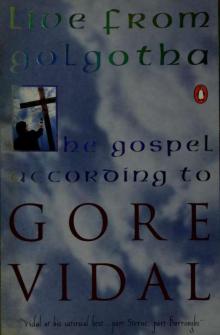 Live From Golgotha
Live From Golgotha Lincoln
Lincoln Death Likes It Hot
Death Likes It Hot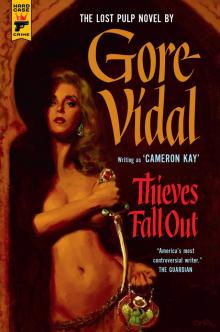 Thieves Fall Out (Hard Case Crime)
Thieves Fall Out (Hard Case Crime) Point to Point Navigation
Point to Point Navigation Williwaw
Williwaw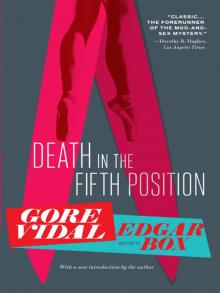 Death in the Fifth Position
Death in the Fifth Position In a Yellow Wood
In a Yellow Wood Julian
Julian Hollywood
Hollywood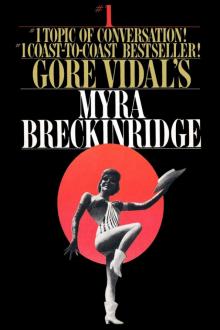 Myra Breckinridge
Myra Breckinridge Messiah
Messiah The Second American Revolution and Other Essays 1976--1982
The Second American Revolution and Other Essays 1976--1982 Homage to Daniel Shays
Homage to Daniel Shays Empire
Empire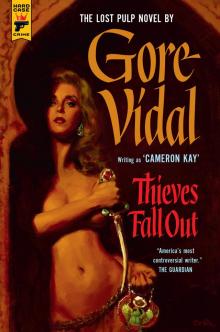 Thieves Fall Out
Thieves Fall Out 1876
1876 The City and the Pillar
The City and the Pillar The Golden Age
The Golden Age At Home
At Home